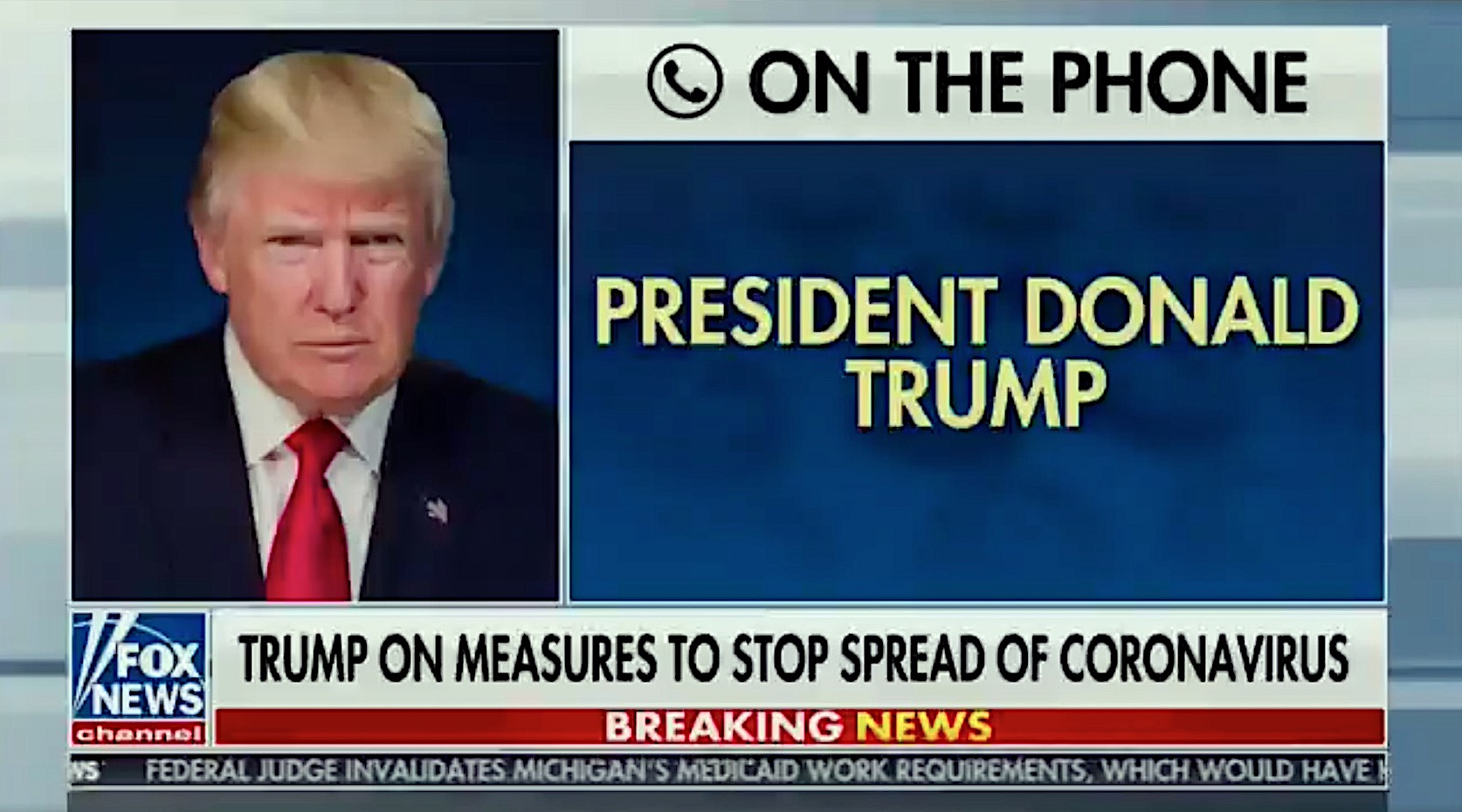Trump has a 'hunch' the COVID-19 death rate is 'way under 1 percent,' calls the WHO's 3.4 percent 'a false number'


A free daily email with the biggest news stories of the day – and the best features from TheWeek.com
You are now subscribed
Your newsletter sign-up was successful
On Tuesday, the World Health Organization announced that the mortality rate for the new COVID-19 coronavirus is higher than the original 2.3 percent estimate.
"Globally, about 3.4 percent of reported COVID-19 cases have died; by comparison, seasonal flu generally kills far fewer than 1 percent of those infected," WHO Director General Tedros Adhanom Ghebreyesus told reporters. "While many people globally have built up immunity to seasonal flu strains, COVID-19 is a new virus to which no one has immunity; that means more people are susceptible to infection, and some will suffer severe disease."
President Trump told Fox News host Sean Hannity on Thursday night that the WHO is probably wrong. "Well, I think the 3.4 percent is really a false number," he said. " Now, this is just my hunch, but based on a lot of conversations with a lot of people that do this." Because 11 people have died in the U.S., "all of a sudden is seems like 3 or 4 percent, which is a very high number, as opposed to a fraction of 1 percent," Trump added. "Personally, I would say the number is way under 1 percent."
The Week
Escape your echo chamber. Get the facts behind the news, plus analysis from multiple perspectives.

Sign up for The Week's Free Newsletters
From our morning news briefing to a weekly Good News Newsletter, get the best of The Week delivered directly to your inbox.
From our morning news briefing to a weekly Good News Newsletter, get the best of The Week delivered directly to your inbox.
Trump also explained why he wasn't concerned about the coronavirus at first, according to CNN's Daniel Dale.
At MSNBC, Chris Hayes discussed what the Trump administration failed to learn from China's coronavirus experience, primarily that "you have to be clear, honest, and transparent about the scope of the virus and the infection."

You can watch the entire Trump interview at Fox News.
A free daily email with the biggest news stories of the day – and the best features from TheWeek.com
Peter has worked as a news and culture writer and editor at The Week since the site's launch in 2008. He covers politics, world affairs, religion and cultural currents. His journalism career began as a copy editor at a financial newswire and has included editorial positions at The New York Times Magazine, Facts on File, and Oregon State University.
-
 The ‘ravenous’ demand for Cornish minerals
The ‘ravenous’ demand for Cornish mineralsUnder the Radar Growing need for critical minerals to power tech has intensified ‘appetite’ for lithium, which could be a ‘huge boon’ for local economy
-
 Why are election experts taking Trump’s midterm threats seriously?
Why are election experts taking Trump’s midterm threats seriously?IN THE SPOTLIGHT As the president muses about polling place deployments and a centralized electoral system aimed at one-party control, lawmakers are taking this administration at its word
-
 ‘Restaurateurs have become millionaires’
‘Restaurateurs have become millionaires’Instant Opinion Opinion, comment and editorials of the day
-
 Trump HHS slashes advised child vaccinations
Trump HHS slashes advised child vaccinationsSpeed Read In a widely condemned move, the CDC will now recommend that children get vaccinated against 11 communicable diseases, not 17
-
 FDA OKs generic abortion pill, riling the right
FDA OKs generic abortion pill, riling the rightSpeed Read The drug in question is a generic version of mifepristone, used to carry out two-thirds of US abortions
-
 RFK Jr. vaccine panel advises restricting MMRV shot
RFK Jr. vaccine panel advises restricting MMRV shotSpeed Read The committee voted to restrict access to a childhood vaccine against chickenpox
-
 Texas declares end to measles outbreak
Texas declares end to measles outbreakSpeed Read The vaccine-preventable disease is still spreading in neighboring states, Mexico and Canada
-
 RFK Jr. shuts down mRNA vaccine funding at agency
RFK Jr. shuts down mRNA vaccine funding at agencySpeed Read The decision canceled or modified 22 projects, primarily for work on vaccines and therapeutics for respiratory viruses
-
 Measles cases surge to 33-year high
Measles cases surge to 33-year highSpeed Read The infection was declared eliminated from the US in 2000 but has seen a resurgence amid vaccine hesitancy
-
 Kennedy's vaccine panel signals skepticism, change
Kennedy's vaccine panel signals skepticism, changeSpeed Read RFK Jr.'s new vaccine advisory board intends to make changes to the decades-old US immunization system
-
 Kennedy ousts entire CDC vaccine advisory panel
Kennedy ousts entire CDC vaccine advisory panelspeed read Health Secretary RFK Jr. is a longtime anti-vaccine activist who has criticized the panel of experts
